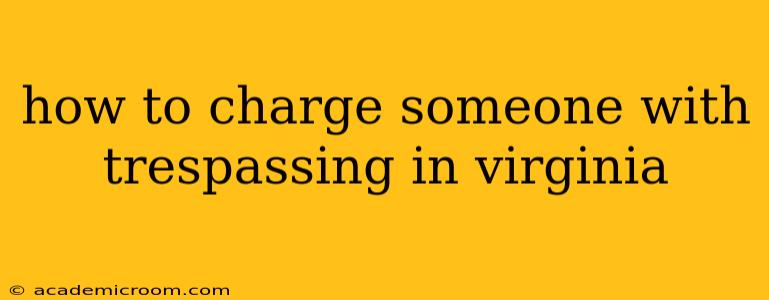Trespassing in Virginia is a serious offense with varying penalties depending on the circumstances. Understanding the legal requirements and procedures is crucial before attempting to charge someone. This guide provides an overview of the process, but it's crucial to consult with law enforcement and legal counsel for specific guidance in your situation. This information is for educational purposes only and not legal advice.
What Constitutes Trespassing in Virginia?
In Virginia, trespassing is defined as entering or remaining on the property of another without lawful authority. This means you must prove the following elements:
- Property Ownership: You must establish clear ownership or legal right to the property. This could involve showing a deed, lease agreement, or other legal documentation.
- Unauthorized Entry: The individual entered the property without your permission or a legal justification (like a valid court order or emergency). A "No Trespassing" sign is helpful but not strictly required. Verbal warning is typically sufficient if reasonably communicated.
- Knowledge of Unauthorized Entry: The individual must have known, or reasonably should have known, that they were trespassing. This element can be challenging to prove.
How to Proceed if Someone is Trespassing on Your Property
Your first step should always be to contact the local law enforcement agency. Do not attempt to physically remove the individual yourself; this could lead to escalation and potential legal problems for you. When reporting the trespass, provide the following information:
- Your Name and Contact Information: Include your address and phone number.
- The Trespasser's Description: Include any identifying features and, if possible, their name.
- The Location of the Trespassing: Be precise about the address or location on your property.
- The Nature of the Trespassing: Explain what the individual was doing on your property.
- Any Evidence: Note any damage, witnesses, or security camera footage.
Law enforcement will assess the situation and determine the appropriate course of action. They may issue a warning, a citation, or make an arrest, depending on the severity of the offense.
Can I Charge Someone Myself?
No. You cannot personally file charges against someone for trespassing in Virginia. Only law enforcement has the authority to initiate criminal charges. Your role is to report the incident to the police and provide them with necessary information and evidence.
What Happens After Reporting the Trespassing to Law Enforcement?
Law enforcement will investigate the incident. If they determine probable cause exists, they might:
- Issue a summons or citation: This is a formal notice requiring the individual to appear in court.
- Make an arrest: An arrest is more likely if the trespass involved violence, threats, or other serious offenses.
The court will then decide whether the individual is guilty of trespassing.
What are the Penalties for Trespassing in Virginia?
Penalties for trespassing vary depending on the circumstances. They can range from a misdemeanor to a felony, depending on factors such as prior convictions, the presence of weapons, or if other crimes were committed. Possible penalties include:
- Fines: Significant monetary penalties.
- Jail time: Potential for imprisonment.
- Court costs: Costs associated with the legal proceedings.
What if the Trespassing is Ongoing or Repeated?
Repeated trespassing is a serious issue and should be reported to law enforcement immediately. Documentation of each instance, including dates, times, and descriptions, can be crucial. You may also want to consider civil remedies such as obtaining a restraining order or filing a civil lawsuit for damages.
What constitutes "lawful authority" to be on someone else's property?
Lawful authority might include having express permission from the property owner, possessing a valid warrant or court order, or being in a situation where emergency circumstances necessitate entry (like responding to a fire or rescuing someone).
How do I prove someone was trespassing if there aren't any witnesses?
Security camera footage, physical evidence (footprints, disturbed property), and your own testimony can all contribute to proving unauthorized entry. The lack of witnesses doesn't automatically mean a case cannot be made.
How do I get a restraining order against a trespasser?
A restraining order requires a court proceeding. You would need to present evidence to the court demonstrating a credible threat of harm or harassment. This process usually involves legal representation.
This information is for educational purposes only and should not be considered legal advice. Always consult with law enforcement and an attorney for advice specific to your situation. Remember, taking the law into your own hands can have serious consequences.
